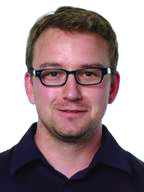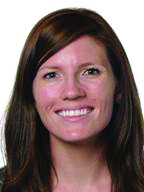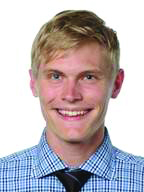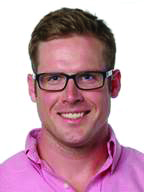CMS foundation helping students
CMS Education Foundation 2013-2014 scholarship recipients
by Michael J. Campo, PhD, support staff, Colorado Medical Society Education Foundation
University of Colorado School of Medicine freshmen Louis Fitch, Lindsey Herrera, Ethan Muhonen and Paul Pokrandt were each awarded a $10,000 scholarship from the Colorado Medical Society Education Foundation (CMS EF) in June.
The mission of CMS EF, a 501(c)(3) private foundation, is to render financial support to select first-year medical students at University of Colorado School of Medicine based on criteria such as the student’s financial status, academic achievement and desire to practice in rural or underserved areas upon graduation. In addition to providing scholarships, CMS EF supports education programs such as the Colorado State Science and Engineering Fair and the Education Program at the CMS annual meeting.
“The CMS EF Board appreciates the generous donations and support from CMS members who make our scholarships possible,” said CMS EF Board Chair W. Gerald Rainer, MD, a distinguished clinical professor of surgery at the University of Colorado Anschutz Medical Campus.

Louis Fitch, prior to his arrival at the University of Colorado School of Medicine, received a Bachelor of Arts degree in Traditional Eastern Arts from Naropa University in Boulder, Colo. While there, he was on the Dean’s List from 2009 to 2012; was named the 2010-2011 Organic Chemistry Student of the Year; was awarded DaVita Bone’s Award for patient care and team support of the dialysis staff in 2007-2010; and was honored with membership in the Golden Key Honor Society, Gamma Sigma Epsilon Honor Society, and Beta Beta Beta Honor Society.
Fitch has a diverse background. Born in Colorado but raised in Scotland by Tibetan refugees, he has an understanding of being an outsider and of the challenges of growing up in multiple cultures. He uses this as a resource in understanding the complexity of social, economic and cultural barriers. Returning to Colorado after 12 years away, he continued to face similar challenges.
“Serving the underserved is not theoretical or abstract in the slightest; I know what it means to not have access to food, shelter or basic health care. This knowledge drives me and will be a pivotal part of my life as a medical student and a physician – it is my motivation,” he said.

Lindsey Herrera received a Bachelor of Science degree in Chemistry from Colorado State University - Pueblo. She was born in Durango, Colo., and raised just over the state line in La Plata, N.M., (population 600), in a very rural area surrounded by several Indian reservations. At age 11 her family relocated to Pueblo, Colo. She volunteered at the Pueblo County Health Department. Growing up in both communities exposed her to different health disparities and she witnessed firsthand the impact that socioeconomic status and cultural differences can have on a person’s access to health care.
“Lack of (medical) access is an increasingly pertinent problem in rural communities. When these citizens are in need of medical care, they often must travel to obtain it, sometimes for several hours at a time. With more and more physicians choosing to practice specialized medicine in urban areas, the rural population has suffered a great loss. Because of all these experiences, I have decided to become a family practice physician,” Herrera said.
While in college she was a varsity cross-country runner. She was team captain in the 2008 season, selected to the 2007 all-conference academic team, and received a number of other honors and served on several national committees. Athletics has provided Herrera many life lessons such as how to cooperate with people of different backgrounds to reach a common goal; the value of hard work and the importance of practice and preparation; effective leadership, perseverance over setbacks and time management. All of these lessons can be used in the everyday world.

Ethan Muhonen attended Stanford University and received a Bachelor of Arts degree majoring in Human Biology with Honors. He received two competitive grants to fund his research in 2011 and 2012, the Human Biology Research Exploration Grant (2011) and the Stanford Undergraduate Advising and Research Major Grant (2012). Muhonen continued with additional research and education at Oxford University.
Muhonen grew up in a log house situated in a valley of the Colorado Rocky Mountains. The desire to explore was ingrained from a very young age. At Stanford he used this desire as fodder for questions in his pursuit of the study of human biology, ranging from biology, psychology, sociology and political science. He then focused his studies and research more precisely in the area of neuroscience and continued his research and education at Oxford University.
During his formative education he was exposed to a number of global rural communities, and became aware of the immense need for health care that exists in economically disadvantaged nations. Closer to home he has been exposed to underserved urban populations in New York City, East Palo Alto, Calif., and most recently Weld County, Colo., which has given him new perspective on the health disparities present in the Northern Colorado community, particularly among immigrant and farming populations.
“Collectively, these experiences have left me with an enduring desire to help alleviate these health disparities as my ability to intervene increases. This desire, in conjunction with my love of the outdoors, makes applying my medical skills in medically underserved mountain communities one of the most fulfilling endeavors I can conceive of,” said Muhonen.

Paul Pokrandt received his Bachelor of Arts degree in Chinese Economics from the University of Colorado at Boulder in 2009. He then continued his education at the Capital University of Economics and Business in Beijing, China, an affiliated program of Hamilton College in New York. Later in 2011-2013 he studied at the University of Colorado – Denver and majored in Biology.
After leaving his financial career, he sought work where he could be a part of a team that could make a difference in the lives of individuals who are underserved. To explore his interest in medicine, he began work as a medical assistant in a pediatric clinic serving the uninsured. “For three years I went to work every day at Goldman Sachs… yet never felt I helped a single person in a meaningful way,” he said. “In contrast, on my first day as a medical assistant, I directly helped 20 different families in my own community.” This experience secured his desire to enter medical school.
While most of his experiences have been in urban environments, Pokrandt says he has spent “a significant amount of time in rural areas” due to his love of the outdoors and as a result of family connections. “In order to get experience in rural medicine, I will be partaking in the “Rural Track” program. I am not sure whether I will ultimately decide to serve the needy in a rural or an urban environment, but I have no doubt that I will certainly continue to serve them in one location or another.”
Posted in: Colorado Medicine

Comments
Please sign in to view or post comments.